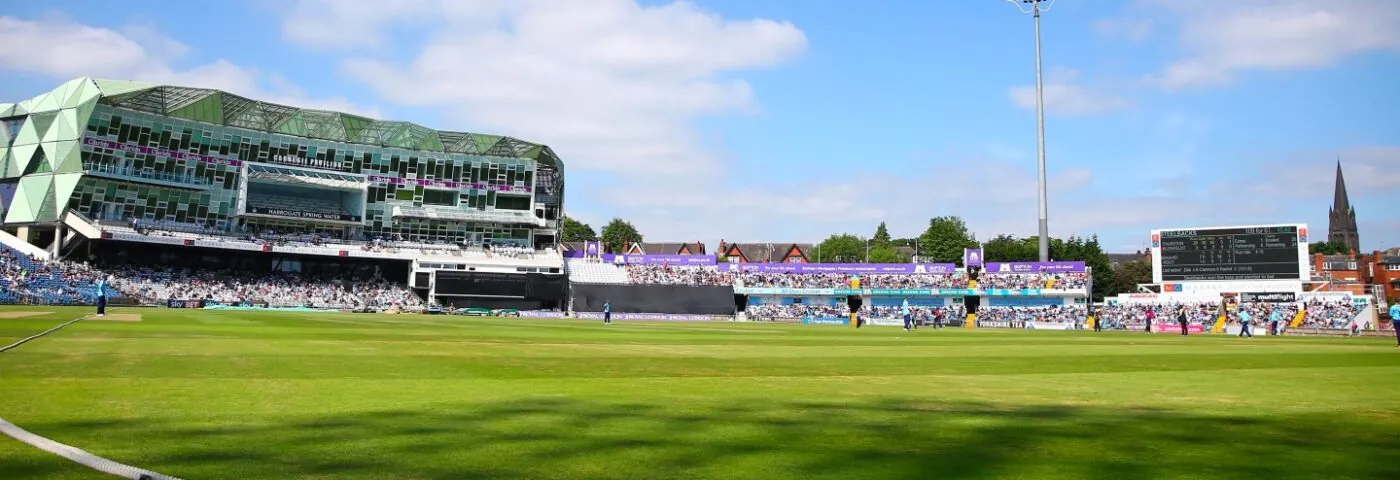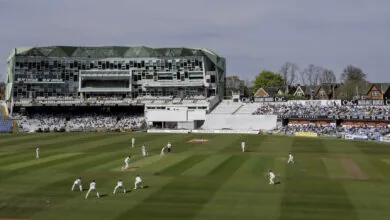Along with 1948, 1981, 2001 and 2017 the Headingley Test of 2019 will go down in folklore as being made of the stuff of legendary status in that all of these five games resulted in completely improbable results. Several records were broken this year, some of which were noted elsewhere, but others which were not and Paul Dyson looks at these. The picture of Fred Trueman appears courtesy of Mick Pope.
Amongst all the euphoria which greeted the unbelievable last day’s play, let’s start at the very end of the game.
NARROW VICTORY
The result of Headingley’s 2019 Test was a win for England by one wicket and this is the narrowest such Test win at the ground. In 1982 England beat Pakistan by three wickets and, in turn, Pakistan beat Australia by the same margin in 2010. The narrowest win by a runs margin was at the end of the famous 1981 match when England prevailed over Australia by 18 runs.
TENTH–WICKET STAND
The epic unbeaten tenth-wicket stand which concluded this year’s Headingley Test is a new England record for the ground. The previous best was 61 by David Brown and Derek Underwood (45 not out) also against Australia, in 1968. Stuart Broad was involved in a tenth-wicket stand – also of 61 – when he made 67 not out against South Africa in 2008 and was supported by Darren Pattinson whose brother, James, was playing in the 2019 Test. This represents the first case of brothers appearing in Headingley Tests for two different countries. Incidentally the highest tenth-wicket stand for all countries at Headingley is 103 by a pair of South Africans in 1929. Coming in the third innings of the game it only delayed the inevitable with England winning by five wickets.
FOURTH INNINGS TOTAL
England’s 2019 fourth innings of 362 for nine is their highest in a winning cause in all Test cricket. England’s previous best at Headingley was 315 for four against Australia in 2001 when Mark Butcher scored his memorable 173 not out and England unexpectedly won by six wickets after the Ashes were already destined to return to Australia. The only two other highest fourth innings at Headingley, whatever the result, are Australia’s famous 404 for three in 1948 (Arthur Morris 182 and Don Bradman 173 not out) and 322 for five (Shai Hope 118 not out) by the West Indies just two years ago, both resulting in wonderful victories for the visiting teams.
DAY TWO DISASTER
England’s total of 67 in their first innings of the 2019 match is their lowest at the ground. It replicates New Zealand’s innings of the same score in 1958 but is six runs more than West Indies managed in 2000. England’s ten wickets fell for a total of 57 runs (from 10-0 to 67) and this is the most dramatic ten-wickets collapse in a Headingley Test except for New Zealand’s 30-run capitulation from 37-0 to 67, obviously also in 1958.
FROM DISASTER TO VICTORY
One of the features of England’s two innings in the 2019 Test was the size of the difference – 295 runs – between the two totals of 67 and 362 for nine. This appears not to have been commented on much in the media and is the biggest difference for England in a Headingley Test. The previous record was 239 when England scored 430 (Allan Lamb 125) and 191 (Terry Alderman five for 44) in 1989 only to lose to Australia by 210 runs. The biggest difference between innings totals by any country at Headingley occurred in 2006 when Pakistan’s gap was a huge 383 runs; they scored 538 (Mohammad Yousuf 192 and Younus Khan 173) and 155 (Sajid Mahmood four for 22) in the process losing to England by 167 runs.
BROAD’S BATTING
Stuart Broad was unfortunate in claiming an unwanted Headingley Test record in that his second-innings duck was his fourth and this equalled the record held by Andrew Flintoff and Derek Underwood. Surprisingly, Flintoff made his four ducks in only nine innings. He is the only player to make two pairs in Headingley Tests; these were in 1998 and 2002 and comprised his first four Test innings on the ground.
BROAD’S BOWLING
It was widely reported that Broad became the leading wicket-taker in Headingley Tests during the 2019 game. He now leads Fred Trueman by three wickets, although he has played in one Test more.




